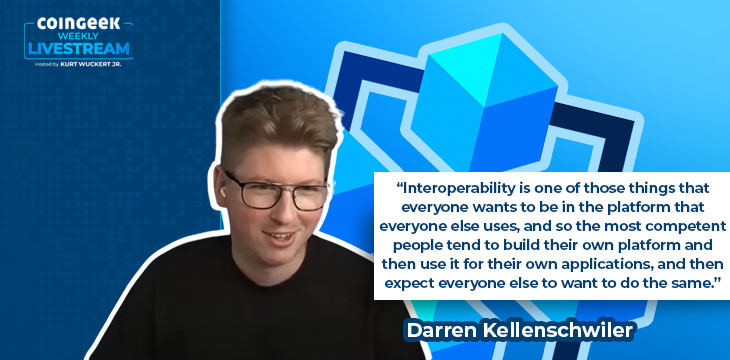|
Getting your Trinity Audio player ready...
|
On Episode 4 of the CoinGeek Weekly Livestream, Kurt Wuckert Jr. talks to Darren Kellenschwiler, also known as Deggen on YouTube, about building on Bitcoin. Kellenschwiler is the Chief Technical Officer at Elas and the Developers Community Manager of the BSV Blockchain Association.
Ordinals on BTC
Wuckert asks Kellenschwiler if he’s up to speed on the Ordinals NFT situation on BTC. He says he is not and asks what it’s all about.
Wuckert explains that a developer has created a protocol scheme to turn individual satoshis into non-fungible tokens (NFTs).
“It has broken the internet,” he says, noting that the whole point of the Bitcoin civil war was to prevent this sort of thing. However, this developer has figured out a way to put image-based NFTs on BTC, deeply upsetting the small-blocker maximalists who claim Bitcoin is under attack.
Kellenschwiler says he has been working on a token platform that, conceptually, will be very similar. It’s called Buzzmint.
Unlike BTC fanatics, BSVers have no problem with useful token platforms. He speaks about how easy it is to develop applications on Bitcoin now, thanks to indexing services like JungleBus. Services like this will allow people to focus on their businesses rather than running nodes, the two agree.
Kellenschwilers’ Bitcoin story
Wuckert always asks guests what their Bitcoin story is, and so he urges Kellenschwiler to tell his.
“2013-ish,” Kellenschwiler replies, remembering how he heard about it from an engineer friend in England. At first, he dismissed it as “internet POGs,” but after growing interested in how economics and money work, he started day trading Bitcoin and ended up selling a business and putting all of his cash into it.
Eventually, Kellenschwiler started coding and tinkering with Bitcoin applications. He moved to London and began traveling to events. These days, he works for Elas and is developing applications related to Metanet, among other things.
In the immediate future, Kellenschwiler is excited to attend the London Blockchain Conference. He’s also interested in creating BSV meetups in Austin, where he’s currently based.
On LiteClient
Wuckert recalls the excitement when LiteClient was first announced. However, he feels there’s a huge lack of clarity about what it is, who would run it, etc. He asks Kellenschwiler to clarify and explain his participation in creating it.
The main pushback is from developers who are so used to running full nodes that they’re “reluctant to even consider that running a Merkle root is as secure as all of the data in the entire block,” Kellenschwiler says. “That’s the main concept people don’t get.”
Exchanges and wallet developers are particularly reluctant to accept it, but application developers are far ahead.
Wuckert recalls a conversation with Dr. Craig Wright in Oslo in which he explained that, when everyone runs nodes, this simply replaces the Byzantine Generals Problem, which proof-of-work solved for a “Byzantine soldiers problem.” There are so many more of them, and it’s much harder to coordinate them, Wuckert notes, recalling how he had a lightbulb moment when Dr. Wright said it.
What’s coming for LiteClient in the future? Kellenschwiler thinks it will change how transactions are broadcast to the network. At the moment, most app builders will use a merchant API, but these will soon be replaced by new apps that give extra features, such as guarantees of broadcast acceptance. Long-term, the future of LiteClient is IPv6, multicast, and much more. This will all make the Bitcoin economy more efficient.
Viewer questions and answers
Q. Why are edges important when programming in Bitcoin?
“Imagine the infrastructure that supports the internet at the moment,” Kellenschwiler says, painting a picture of the massive server farms that hold it all together. In a Bitcoin-powered world with multicast and IPv6, this will move toward the edges. It’s not like that now because it’s difficult to monetize, whereas Bitcoin allows us to monetize every packet.
Q. What’s the latest on the COPA case? What cases will we see next?
It’s in “something of a holding pattern,” Wuckert says. He has heard that the Kleiman case will go back to judge Bruce Reinhart, who notoriously dislikes Dr. Wright, but he doesn’t have any further information right now.
Watch: London Blockchain Conference 2023 – Bringing government and enterprise onto the blockchain

 02-16-2026
02-16-2026 




